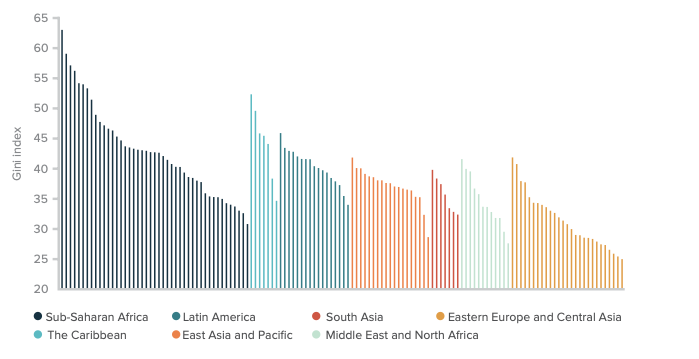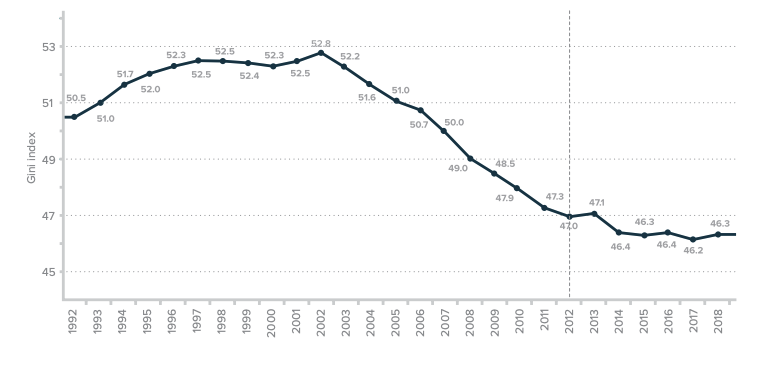Introduction
There are numerous problems in the world that continue to undermine all the benefits that the rapid social evolution and technological progress bring. One of the issues that should be addressed immediately by all governments is extreme inequality. Despite the successful implementation of a wide range of measures that helped fight such disparities in most Western societies, Latin American nations continue to struggle from a plethora of problems that are rooted in inequality. Nevertheless, recently some governments in the region have been particularly enthusiastic in developing new ingenious strategies to help the poor. I strongly believe that a dedicated analysis of such measures can ensure increased living standards in one of the world’s most diverse regions.
The Global Importance of the Issue
Why does fighting inequality in Latin America matter to the rest of the world? First, the region’s political life has been extremely turbulent for several decades. It means that some of the vital social institutions in various states are not efficient enough to ensure rapid and sustainable development. Such a situation leads to a wide range of social problems, including discrimination, drug trafficking, street crime, high levels of violence. All the above-mentioned troubles directly affect the well-being of millions of Americans. Drugs and illegal migration have been devasting various neighborhoods across the US. It is just one of the examples, as Europe and even some Asian countries also experience difficulties that are rooted in social issues in Latin America.
What is more important, Latin American nations have high chances of successfully and quickly overcoming many of the above-mentioned challenges. Governments in the region are generally enthusiastic about developing and implementing new strategies, as political parties constantly face severe competition. Thus, just like in the 20th century, numerous social experiments (this time, predominantly positive) can change societies there in a due manner. Latin American nations that manage to find the efficient means to enhance the living standards of millions of citizens will become role models for numerous developing countries that currently experience rapid population growth (most of them in Africa). Therefore, the ability of Latin American nations to overcome difficulties and get rid of numerous constraints will ensure the successful implementation of similarly efficient strategies in countries where billions of people live.
The Core of the Problem
Maybe the fact that few nations in the region are high-income economies is the cause of many issues? It can not be so, as there are numerous nations in the world that are not rich but do not struggle with such a wide range of social problems. Therefore, there must be something unique about Latin America that hinders its development and does not allow it to reach the level of prosperity and well-being of other Western societies. It is undoubtedly the extreme levels of inequality that deprives millions of people living in poor neighborhoods of access to high-quality education, medical services, and cheap credit.

Despite the gradual decreases in income inequality that take place due to multiple changes in taxation and legislation, there are other problems that underline social issues. Wealth inequality has always been a feature of most Latin American nations, as a few aristocratic families usually owned the most fertile land in the 19th century. Therefore, unlike in the 19th-century US, new migrants could not easily acquire free land and had to toil for the rich. Such disparities from the outstart hindered the development of a large middle-class that is instrumental in creating a free and prosperous society.
Simply raising the taxes and redistributing the money to the poor is not an optimal solution. A much more complex and scientific, data-driven approach should be utilized in order to address the issue efficiently. New frameworks should be developed and established that will seek to help people truly realize their potential by incentivizing them to use their strengths and talents.
Fighting extreme poverty implies the utilization of a unique set of urgent measures and a wide range of strategies. Cheap credit or interest-free loans have already proven to be beneficial when they are granted to hard-working families that desperately need resources, such as tools, land, materials, or money to pay the rent. Once dedicated institutions or charities realize that a family will spend a substantial amount of money in an efficient way, it should ensure rapid transit of the low-interest or interest-free loan. Moreover, it is highly desirable to establish or encourage the creation of organizations that ask for money back only in case a poor family’s enterprise is successful and starts generating income.
Covid-19
One of the factors that further exacerbates the inequality problem in Latin America is the Covid-19 pandemic and the numerous measures that seek to stop the spread of the virus. Therefore, all the above mentioned has substantially widened the income gap. According to Regional Human Development Report (2021), in these unprecedented circumstances, 22 million more people have fallen below the poverty line in the region, returning to 2008 levels. Moreover, lower commodity prices and slower growth in China, however, have reduced Latin America’s growth prospects (Messina & Silva, 2018). What is more, due to the fact that the middle-class is relatively small, few people have the opportunity to work from home, which is in sharp contrast with the situation in more prosperous Western countries.
Moreover, the Covid-19 pandemic hinders the chances of millions of pupils and students to continue the education process online. According to Delaporte et al. (2021), social distancing measures have led to an increase in inequality in Latin America. A large portion of families in the region have more than two children, which makes it hard for any family with income levels below average to provide each child with a laptop. Furthermore, there are numerous areas even within the city boundaries where the speed of Internet connection is not sufficient enough to ensure proper conditions for working or learning from home.
The successful cases from the 2000s that featured the improved living standards of millions of workers in Latin America include Argentina, Uruguay, and Brazil. In the first two examples, labor unions managed to contribute to the establishment of a safety net that helped many professionals finally get decent salaries. In Brazil’s scenario, the substantial rises in minimal wage helped fight the situation where millions of people living in the cities with high living costs had to toil for a few dollars a day. Therefore, there are multiple success stories that can be repeated despite the disastrous effect both the Covid-19 pandemic and the consequent economic repercussions had on the region.

Various Types of Inequality
Income inequality, wealth inequality, and extreme poverty are not the only types of inequality that people in Latin American struggle with. Various types of horizontal inequalities (based on differences in sex, ethnicity, or race, just to name a few) are still a major issue. Women continue to earn much less than men and frequently face a “glass ceiling” due to numerous stereotypes. Ethnic minorities still lack recognition as active political and economic agents. Moreover, they are sometimes left behind in access to various social services.
Governments in the regions do not allocate enough resources to the development of various facilities in remote rural areas, while, in fact, it is the most crucial measure that can really ensure the rapid enhancement of living standards. There seems to be a lack of truly independent politicians that are capable of staying determined to achieve long-term goals. Thus, the political systems in many countries in the region seem to lack the real opportunity to represent large portions of the population. Sometimes even certain multinational corporations seem to understand more in the importance of creating proper living standards and working conditions that rapidly enhance productivity.
Governments and technocrats have to fight numerous imbalances that do not allow for a more equal distribution of access to basic services and resources. The extreme riches that a minor portion of the population possess deprive them of the chance to employ a much more efficient investment-oriented approach to their numerous assets. It is difficult to realize what stands behind the lack of compassion that the rich show to the millions of poor people living in their countries. In many Latin American cities neighborhoods for the extremely rich are located just next to poor communities.
Trust is instrumental in the creation of a properly functioning state and creating a harmonious society. Walking along the streets in Latin American cities makes it vivid that the rich do not trust the poor and are willing to distance themselves as far as possible from everything associated with poverty. In many cases, the motivation behind such measures seems to go far beyond safety concerns. Therefore, in the 21st century, it is crucial for every nation to find something that brings people together.
States that used to have socialist governments provide a unique example. Despite the fact that after the fall of the Soviet Union inequality rates skyrocketed in many countries, it is clear that most of them did not encounter many of the issues that Latin American nations face. In states that used to be socialist, people have relatively equal access to free or cheap health services and education. Despite the income inequality that can be extremely high, the poor and the rich continue to go to the same hospitals and to study at the same schools. The frequent opportunities (or necessities) to interact with people from all walks of life allow for much higher compassion levels.
When each member of a diverse society can understand all the hardships that others have to go through, it makes a nation tolerant and cooperative. Consequently, it leads to rapid accumulation of wealth that can be then redistributed evenly. The success story of the US economy is not based solely on strong work ethics and efficient levels of market regulations. It is also based on meritocracy, meaning that children of recent immigrants could become wealthy due to equality of opportunity.
Education
Education has always been considered instrumental in ensuring future success. Despite the numerous attempts to claim that the rich always enjoy better educational opportunities due to their parents’ financial resources, I strongly believe that it is definitely not the case in the 21st century. The access to enormous amounts of free online information that people enjoy can ensure that they can become valued professionals in the labor market. Moreover, the free-market economy implies that numerous companies are in a constant struggle to enhance their profitability by various means, including the reduction of costs. Labor is still an important factor that influences prices for goods and services. Therefore, even small and medium-sized companies are willing to hire professionals from countries with lower living costs.
One important example concerning the change in the government’s attitude to education includes the numerous social programs in Brazil that helped incentivize school pupils from poor families to actually go to schools. In fact, their parents were paid if children attended the classes. According to Clifton et al. (2020), public spending on education, personal income taxes and social contributions are especially instrumental in reducing income inequality. Thus, sums that are insufficient for a federal government help motivate a large number of children to acquire knowledge and make the first steps that can lead to a successful career in a country where industrious professionals enjoy truly high living standards.
Tourism and City Environment
There are plentiful strategies that governments can employ in order to fight inequality and all the numerous issues that are associated with it. One of the easiest and, at the same time, one of the most efficient options is bringing people together. Modern cities that feature great architecture, nice infrastructure, and a wide range of cultural sites, social institutions are all relatively safe all around the world. Once pleasant changes take place in a city that makes millions of tourists from different parts of the world go there, locals in most cases rapidly change their own perception of the place they live in.
Although such strategies seem to be extraordinary and insufficient to address various social issues, they actually work great in the 21st century. Especially in the case of Latin America, where amazing climate, bright unique nature, and the proximity to warm oceans and seas allows for room for maneuver concerning the above-mentioned approaches. Tourists always bring a lot of dollars to the places they find exotic. That alone can be extremely beneficial for a struggling economy, as worldwide popularity as a tourist destination ensures higher incomes, enhanced infrastructure, and the creation of millions of new jobs.

Moreover, the rich that suddenly begin to enjoy the improved environment around them also start to invest in local real estate, purchase local products, go on vacation to places in their own countries. In the case of Latin America, it can help keep enormous sums of money in the country that will boost various sectors of the economy. In any case, such a scenario is much more preferable than all of those dollars going to a handful of luxury brands and well-known resorts.
What is more important, people in the 21st century do not use the Internet on a daily basis just to perform daily tasks in a more efficient way. They actually rely on the thousands of opinions and images that are thoroughly processed by social media algorithms. One post of a truly influential blogger is enough to draw the attention of millions of people worldwide to any product, service, destination.
Creating a truly appealing image of a neighborhood, a city, a country has become an extremely important goal of governments and local municipalities. People living in a place that is admired globally are far more satisfied with their lives, even if the economy struggles. Thus, building new infrastructure that everyone can access, enhancing public space design, redevelopment and landscaping can help increase the living standards of millions of people substantially in a rapid and cost-efficient manner. The above-mentioned strategy is especially beneficial to Latin America with its pleasant climate, which will allow to later employ it in India and African countries.
Transport
Transportation is also an extremely important tool that can encourage people of all walks of life to finally meet each other and start interacting. Efficient and comfortable public transport has proven to be one of the greatest methods to fight inequality. Once the rich realize that they do not necessarily have to use their cars all the time and occasionally use various other options in the city centers, it quickly enhances the perception of public transport in general.
Even if extremely rich businessmen lack the motivation to actually start using it, there is another rapidly growing part of the population that is considered to be privileged in Latin America. Just like in Europe, numerous officials and other public sector workers can be incentivized to use public transport more often. Given the importance and current popularity of green technologies, technocrats and officials should jump at the opportunity and create a highly efficient public transit network.
One of the greatest and brightest examples of the importance of new city infrastructure projects for society is the construction of aerial cable car urban transit systems that have recently become extremely popular across Latin America. Although they are generally perceived as tourist attractions in Europe and the US, they play an important role in many countries in Latin America for a number of reasons. Some of the most populous and important cities in Latin America suffer from large differences in elevation of neighborhoods or neighboring cities (that in some cases exceeds 1000 ft.). Therefore, only aerial cable cars can truly help under such circumstances.

Arguably, the most important and the most popular of the recently constructed systems is Teleférico La Paz–El Alto. The longest aerial cable car urban transit system in the world that can currently boast of colorful 36 stations does not only substitute winding, congested roads. It brings people of different social statuses together, as thousands of people living in poor remote neighborhoods were finally granted an opportunity to commute to the city centers of the two rapidly developing cities. Therefore, new technologies often allow for ingenious and bright inexpensive solutions that do not only create new economic opportunities but also efficiently address numerous social issues.
Conclusion
There are multiple factors that stand behind the struggle of Latin American nations to fight various types of inequality. Despite the importance of eliminating extreme income inequality, new opportunities and new social tendencies allow for a far more rapid resolution of some of the problems with the help of ingenious methods and techniques. It is possible to enhance the living standards of millions of people living in enormous urban centers in different parts of Latin America by providing them with the opportunity to get an education and find a job with decent pay in the city center or online. Helping people in Latin American countries stay optimistic about their opportunity to start their own business or become successful professionals in a pleasant city is instrumental in eliminating extreme poverty in the region.
References
Candia A. (n.d.). Web.
Clifton, J., Díaz-Fuentes, D., & Revuelta, J. (2020). Falling inequality in Latin America: The role of fiscal policy. Journal of Latin American Studies, 52(2), 317–341. Web.
Delaporte, I., Escobar, J., & Peña, W. (2021). The distributional consequences of social distancing on poverty and labour income inequality in Latin America and the Caribbean. Journal of Population Economics, 34(4), 1385–1443. Web.
Messina, J., & Silva, J. (2018). Wage inequality in Latin America: Understanding the past to prepare the future. World Bank Publications.
Mi Teleférico (n.d.). Web.
United Nations Development Programme. (2021). Regional human development report 2021. Trapped: High inequality and low growth in Latin America and the Carribean. Web.